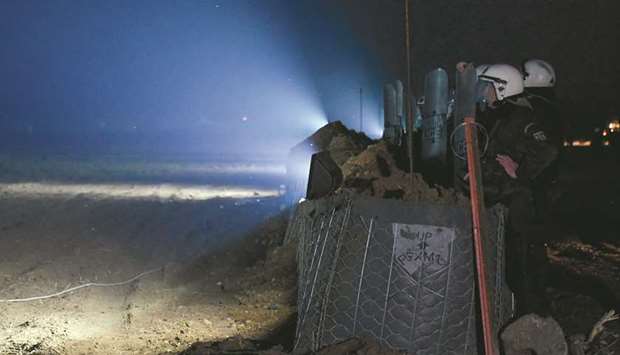EU border protection officers from the Frontex agency launched a surveillance operation along the border between Turkey and Greece yesterday to help Athens stem a surge of migrants.
Greece had asked Warsaw-based Frontex for back-up, and welcomed 100 agents from 22 EU member states, at the Kastanies border crossing point where they began patrols near the border fence and “along routes in the region”, a government source said.
The EU agency has already provided more than 500 officers and equipment to help Greece on five Aegean islands that lie near Turkey.
Thousands of migrants allowed by Turkey to reach the land border with Greece have been massing for two weeks at Kastanies, hoping to make it into the European Union’s Schengen border-free zone.
Greek police have clashed repeatedly with the migrants to prevent them entering.
The development echoed the refugee crisis five years ago when the EU struggled to respond as around 1mn asylum-seekers, mostly from Syria, entered the bloc before a deal was struck with Turkey in 2016 to restrict their flow.
On February 28, Turkish President Recep Tayyip Erdogan said he had “opened the gates” again after the EU held back on support for a military operation in Syria.
“We stand here barely a week after the Greek authorities turned to Frontex to provide more officers and more equipment to help protect their borders, which are also our common EU external borders,” Frontex executive director Fabrice Leggeri said on Thursday in Orestiada, near the border post.
“The presence of 100 officers from all around Europe underlines the fact that the protection of the area of the European area of freedom, security and justice is a shared responsibility of all member states and Frontex,” he said in a statement.
EU members have also pledged to provide equipment “including vessels, maritime surveillance aircraft and thermal-vision vehicles” for the Frontex maritime intervention force in the Aegean, the statement said.
Two Frontex border surveillance planes reinforced Greek security forces earlier in the week as part of co-ordinated operations that “will last two months and could be extended further if needed”, it added.
Meanwhile, medical charity Medicins Sans Frontieres (MSF) has urged Greece to immediately evacuate migrants from overcrowded camps on its islands due to a high risk of the coronavirus spreading swiftly among people living in squalid conditions.
Greece reported its first fatality from the virus on Thursday, in the town of Patra on the mainland.
It has confirmed 117 cases of coronavirus so far, including one on the island of Lesbos, where the Moria camp is located.
“The evacuation of the camps on the Greek islands is now more urgent than ever,” the charity said.
“We need to be realistic: It would be impossible to contain an outbreak in such camp settings,” it said, adding that it had not yet seen a credible emergency plan in case of an outbreak.
More than 40,000 asylum-seekers are living in camps, which are operating far beyond their capacity on five Greek islands.
MSF did not specify where it thought the Greek authorities should transfer the migrants but said both Greece and the European Union should act swiftly to avert a disaster.
The Moria camp on Lesbos was set up to accommodate 3,000 people but now hosts at least five times that number.
The MSF said that in parts of the Moria camp some 1,300 people shared just one water tap and there was no soap available.
“Forcing people to live there as part of Europe’s containment policy was always irresponsible, but with the virus spreading, it is on the verge of becoming criminal if no action is taken to protect people,” it said.
On Thursday, the Greek government suspended visits and activities of non-state organisations in refugee camps for two weeks as a preventative measure against the possible spread of coronavirus, an migration ministry official told Reuters.
The MSF said the suspension affects its operations inside the camps mainly.
“MSF works just outside Moria camp. So far we don’t have any plans to close our clinics,” an MSF official said.

Greek police officers stand guard at the Kastanies border crossing with Turkey’s Pazarkule.
